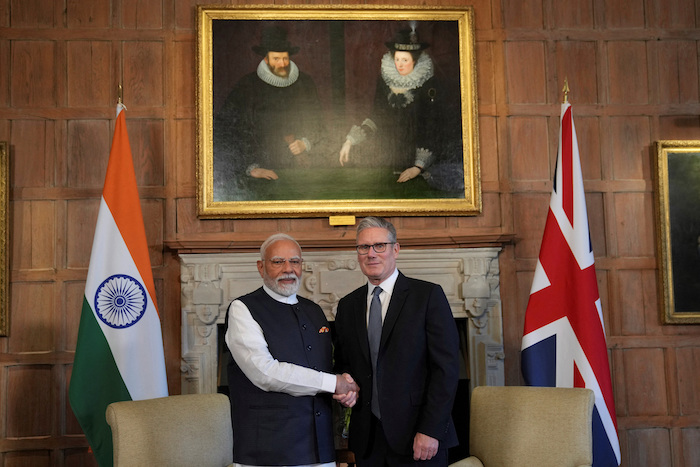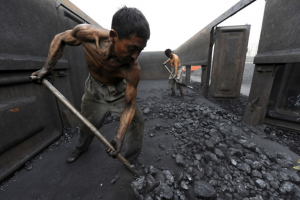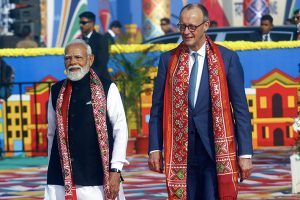Indian Prime Minister Narendra Modi flew to London to sign a free-trade agreement with Britain on Thursday that will slash tariffs and open both markets for greater business.
After three years of negotiations, the two countries – the world’s fifth and sixth largest economies – ended talks on the pact in May, as they sped up efforts to clinch a deal amid the tariff turmoil unleashed by US President Donald Trump.
The deal, which will cut levies on exports such as textiles, whisky and cars, aims to increase bilateral trade by a further 25.5 billion pounds ($34 billion) by 2040.
ALSO SEE: Clashes Along Disputed Thai-Cambodian Border Claim 10 Lives
It comes at a time when India’s leaders have protested about Trump meeting Pakistan’s military chief last month, shortly after a border clash with India.
Trump reportedly discussed an extension of counter-terror collaboration with Field Marshall Asim Munir, which raised concern in New Delhi that any arms Pakistan receives from the US could be turned on India if the neighbours end up in conflict again.
Munir’s lunch in the White House added to India’s chagrin over Trump’s repeated insistence that he averted nuclear war between the two nations by threatening to stop trade negotiations with them. The comment was rejected by Modi, who told Trump the ceasefire was achieved via talks between army commanders of the two nations – not US mediation.
These issues cast a shadow over India’s trade negotiations with Washington, which rapidly went off the boil.
And perhaps not surprisingly, a free-trade deal with Britain seemed far more appealing.
For India, it represents its biggest strategic partnership with an advanced economy, and one which could provide a template for a long-mooted deal with the EU, as well as talks with other regions.
It is Britain’s biggest trade deal since it left the European Union in 2020, although its impact will be a fraction of the effect of leaving the orbit of its closest trading partner.
The trade pact will take effect after a ratification process, likely within a year.
‘Huge benefits for both countries’
British Prime Minister Keir Starmer said the deal would bring “huge benefits” for both countries, making trade cheaper, quicker and easier.
“We’ve entered a new global era, and that is one that requires us to step up, not to stand aside… by building deeper partnerships and alliances,” Starmer said.
Modi said the visit would “go a long way in advancing the economic partnership between our nations”.
They also agreed to a partnership covering areas such as defence and climate, and said they would strengthen cooperation on tackling crime.
India EV-makers get access to UK
Under the trade agreement, tariffs on Scotch whisky will drop to 75% from 150% immediately, and then slide to 40% over the next decade, according to the British government.
On cars, India will cut duties to 10% from over 100% under a quota system that will be gradually liberalised.
In the first year, India will cut the import tariff on large combustion engine cars to 30% for up to 10,000 units and the duty on mid-sized cars will be reduced to 50% for up to 5,000 units, a UK government statement said.
In return, Indian manufacturers will gain access to the UK market for electric and hybrid vehicles, also under a quota system.
For the first five years, there will be no import tax cut on electric, hybrid or hydrogen cars, followed by a reduction from 50% from year six for limited numbers.
The ministry has said 99% of Indian exports to Britain would benefit from zero duties under the deal, including textiles, while Britain will see reductions on 90% of its tariff lines, with the average tariff UK firms face dropping to 3% from 15%.
While it is Britain’s biggest deal since Brexit, the projected boost to British economic output, of 4.8 billion pounds a year by 2040, is small compared to the country’s gross domestic product of 2.6 trillion pounds in 2024.
The Office for Budget Responsibility (OBR) has forecast that UK exports and imports will be about 15% lower in the long run compared with if Britain had stayed in the EU.
In its first year in power, Britain’s Labour government has launched a reset of ties with the EU in order to smooth trade friction, while also clinching some tariff relief from the United States and the India trade deal.
“In an era of rising protectionism, today’s announcement sends a powerful signal that the UK is open for business,” said Rain Newton-Smith, the chief executive of the Confederation of British Industry.
Easier access for business visitors
The India deal will also facilitate easier access for temporary business visitors, though visas are not covered.
Britain and India also agreed to ensure workers no longer have to make social security contributions in both India and Britain during temporary postings in the other country.
Under the trade deal, British firms will be able to access India’s procurement market for projects in sectors such as clean energy, and it also covers services sectors such as insurance.
India didn’t succeed in its efforts to get an exemption from Britain’s Carbon Border Adjustment Mechanism (CBAM) – which could levy higher taxes on polluters from 2027 – as part of the deal.
Meanwhile, talks over a separate bilateral investment treaty are continuing.
- Reuters with additional input and editing by Jim Pollard
ALSO SEE:
India Agrees to Restart Issuing Tourist Visas to Chinese Citizens
Trump’s Dealings With Pakistan Has India Slowing Tariff Talks
India And China Agree to Resume Direct Flights After Five Years
Neighbours Worried About China’s Giant New Dam in Tibet
India And China Resolve Border Row, Agree to Separate Patrols
India’s Close Scrutiny of China Firms Worries Suppliers: Xiaomi
India to Discourage Foreign Trade Settlement in Chinese Yuan
India to ‘Urgently’ Ban China-Linked Betting and Loan Apps
India, US Partner on Chips, AI and Arms to Take on China
India’s TikTok Ban ‘Incredibly Important’: US FCC – TechCrunch
Wang Yi Seeks Normal India Ties, Delhi says Ease Border Row First
























